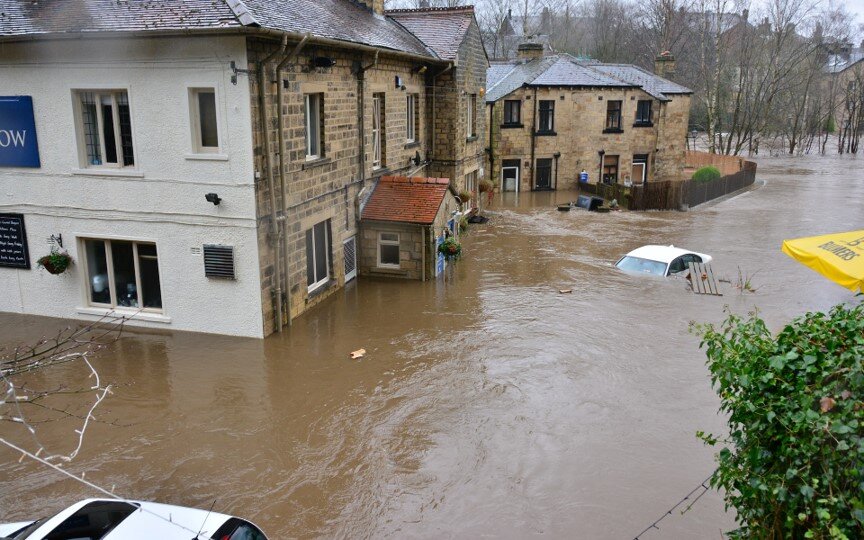A new E3G study shows that the world is getting closer to dangerous climate tipping points and that no country is prepared for the subsequent geopolitical turmoil.
- The world is much closer to breaching climate tipping points in critical Earth systems than previously thought. The consequences are so severe that a better understanding of the risk will have far-reaching implications for global cooperation on technology, finance, food, energy and migration.
- No government or institution worldwide is prepared for a change at the scale needed. While some are integrating climate risk assessments into their planning, none are seriously considering the risk of tipping points and subsequent geopolitical tensions.
- Policymakers can still avoid unmanageable impacts by adopting comprehensive climate risk management frameworks. This includes investing in better data and risk assessment, scaling up finance for vulnerable countries and communities, and strengthening international dialogue on extreme risk.
Story – Climate tipping points reshaping geopolitics
A group of researchers from the independent climate change think tank E3G have studied how climate risk and the measures to avoid breaching tipping points could impact international geopolitics.
Climate tipping points are thresholds of abrupt and often irreversible change in the climate system. The most recent science on extreme risk warns of some climate tipping points already being breached. Additional tipping points could be breached even with less than 2ºC of warming. Some of these include the melting of the Greenland and Antarctic ice sheets, the breakdown of the Gulf Stream, the dieback of the Amazon forest and coral reefs, or the slowdown of the Atlantic Meridional Overturning Circulation.
The impact of breaching these tipping points cannot be measured in economic or environmental terms alone, but they would have dire consequences for human society and international security.
The study has identified the impacts of climate tipping points on five different areas:
- Technologies such as geoengineering are untested and have risks of unintended consequences that could be unevenly distributed geographically.
- Climate finance for adaptation and loss and damage are already contentious and will become more urgent as the risks increase.
- Food security can be threatened by tipping points, contributing to political and social instability.
- Energy security is likely to be affected by breaching tipping points, which could incentivise the energy transition but also change the balance of power between energy producers and consumers worldwide.
- Migration can be exacerbated by extreme climate impacts, causing geopolitical tensions between countries and regions.
These potential geopolitical impacts do not receive enough political attention and planning. This could lead to geopolitical fragmentation where countries choose to “go it alone”, jeopardising ongoing mitigation and adaptation efforts.
Quotes – New study on the geopolitics of climate tipping points
Taylor Dimsdale, Director of E3G’s Risk and Resilience Program, said:
“We’re already struggling to manage climate impacts at just 1ºC of warming. The closer you get to tipping points like ice sheet collapse, the more you start worrying about unmanageable impacts. Understanding those risks will upend everything we think we know about climate change and geopolitics. Policymakers have consistently missed opportunities to prepare for climate change. We literally can’t afford to miss this one”
Carolina Cecilio, Policy Advisor for Risk and Resilience at E3G, said:
“We are living beyond planetary boundaries and pushing the Earth’s climate system to unseen limits. Ignoring extreme risk is even more dangerous in this challenging geopolitical context. Mitigation and adaptation actions at all levels are urgent to prevent breaching new tipping points and minimise the consequences from the ones we already breached”
Ines Benomar, Researcher in Climate Diplomacy and Risk and Resilience at E3G, said:
“With increasing temperatures, there is a serious risk of breaching irreversible climate tipping points. This will result in additional losses and damages. While no countries will be spared, the most climate-vulnerable countries are reaching adaptation limits earlier. Governments need to seriously consider how to manage climate risk as part of their internal and external strategies, to ensure all are protected and the most vulnerable survive”
– ENDS –
Available for comment
The authors of this study are available for commentary – please contact them directly:
- Taylor Dimsdale (author), E3G Program Director, Risk and Resilience
Washington DC – English
m: +1 (0) 240-381-4594 , taylor.dimsdale@e3g.org. - Carolina Cecilio (author), E3G Policy Advisor, Risk and Resilience
Brussels – English, French, Portuguese
m: +32 (0)497 49 69 68, carolina.cecilio@e3g.org. - Ines Benomar (author), E3G Researcher, Climate Diplomacy and Risk and Resilience
Brussels – English, Italian, French
m: +32 (0)490 11 33 19, ines.benomar@e3g.org. - Lisa Fischer (contributor), E3G Programme Leader, Energy Systems
London – English, German, French, Spanish
m: +44 7710 167754, lisa.fischer@e3g.org.
Notes to Editors
- E3G is an independent climate change think tank with a global outlook. We work on the frontier of the climate landscape, tackling the barriers and advancing the solutions to a safe climate. Our goal is to translate climate politics, economics and policies into action. About – E3G
- For further enquiries email press@e3g.org or phone +44 (0)7783 787 863


